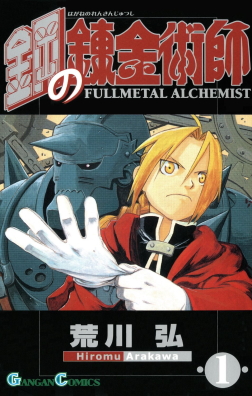Now that it has finally drawn to a close, I can definitively say that Fullmetal Alchemist is the best manga I have ever read. For those who have never heard of it, the comic series' follows two brothers who attempt to revive their dead mother using the art of alchemy. Their spell goes horribly wrong, and Ed, the elder brother ends up loosing his arm and his leg, while the Al younger brother loses his entire body. Ed manages to save his brother by attaching his soul to a suit of armor, and he replaces his lost limbs with robotic prostheses. The two set out to find the Philosophers Stone to recover their lost bodies. While the series' successes can't be attributed to any single element, I believe the most refreshing thing about the series is it's occidental quality; both in terms of aesthetics and narrative structure.
Edward and Alphonse Elric.
Coming from a westerner, I realize that probably seems incredibly arrogant. I'm not trying to say that all manga should strive to follow the conventions of Western fiction but there are certain elements of manga storytelling, and Shonen in particular, that are down-right hackneyed. Most Shonen heroes have no motivation beyond, "I must become stronger so I can protect those dear to me!" The hero gains enough strength to defeat whatever evil that is threatening his beloved comrades, only to run into a bigger and badder beast later on. I can't help but wonder what these school age superheroes would do with their lives if the bad guys ever stopped bothering them.This eternal dissatisfaction with oneself is extremely appealing to adolescents, who really do have to defeat waves of school work while navigating their hormones and the fucked up social conventions that dominate high school, but what do you do when you're done fighting? Shonen rarely attempts to answer those questions.
Fullmetal Alchemist's characters all have hopes and dreams beyond defeating the bad guys. Admittedly, the bad guys themselves are flat, seeing how they're all based on the seven deadly sins. But considering that the villains are homunculi; artificial humans created by alchemy, their unidimensionality is actually quite logical. And series creator Hiromu Arakawa does a brilliant job of personifying Lust, Greed, Gluttony, Sloth, Pride, Wrath and Envy in compelling ways that make them threatening and loathsome.
The other welcome westernization in Fullmetal Alchemist is the ending. Anime and Manga conclusions tend to feature incoherent plot twists, pathetic anticlimaxes, or an explosive, mind-fuck apotheosis. It's partially an East vs. West thing (the emphasis over there being on the journey as opposed to the destination) and it's partially a symptom of the grueling work ethic that defines Japanese culture. Sometimes, creators simply snap from the pressure, as was the case with Evangelion's original ending, which is so horrible it's hilarious. Then again, the "good" ending of Evangelion involves the birth of at least one god and the whole of humanity exploding into puddles of orange juice. This is pretty much par for the course as fas as anime endings go. The obvious explanation is that each of these endings are cultural echoes of what happened to Hiroshima, but knowing that does little to clarify what the hell is happening to the characters you have been following for 26 episodes.
More frequently, especially when it comes to anime adaptations of ongoing manga, artists have to cobble together an ending for a series that has only just begun. This was the case with the original Fullmetal Alchemist anime, where the artists had Ed take a trip to Nazi Germany out of nowhere.
Fortunately, the recently released conclusion of the manga is everything fans could hope for. It's comprehensive, creative, moving at times, and while it lays the main adventure to rest and ties up the important subplots, it also gives readers a good idea of how the characters will live out their lives now that they have vanquished the ultimate evil. There are some over-the top moments in the final fight, but the plot moves too fast to take itself too seriously. That's another thing I love about the series; it is not mellow-dramatic or over-wrought. The plot earns whatever emotional response it desires from it's readers with compelling events. There is very little introspective whining and none of the dramatic posturing that plagues series like Dragon Ball, Bleach and Naruto.
Behold the self-portrait of a genius mangaka. I can't wait for Hiromu Arakawa 's next manga!
That said, Fullmetal Alchemist is still very much a manga. The story has a European aesthetic but the art style is very Japanese. The humor is visual and situational as opposed to sarcastic and cynical. While the pacing of the fights are much more visceral and realistic than most manga, the violence is very highly stylized and at times so complicated that it warrants considerable exposition. If you have the slightest interest in manga, consider Fullmetal Alchemist a must read. Or if you're pressed for time, watch the new anime series, titled Fullmetal Alchemist: Brotherhood, which faithfully follows the plot of the manga at the expense of some abridgment. You can get started here now!



No comments:
Post a Comment